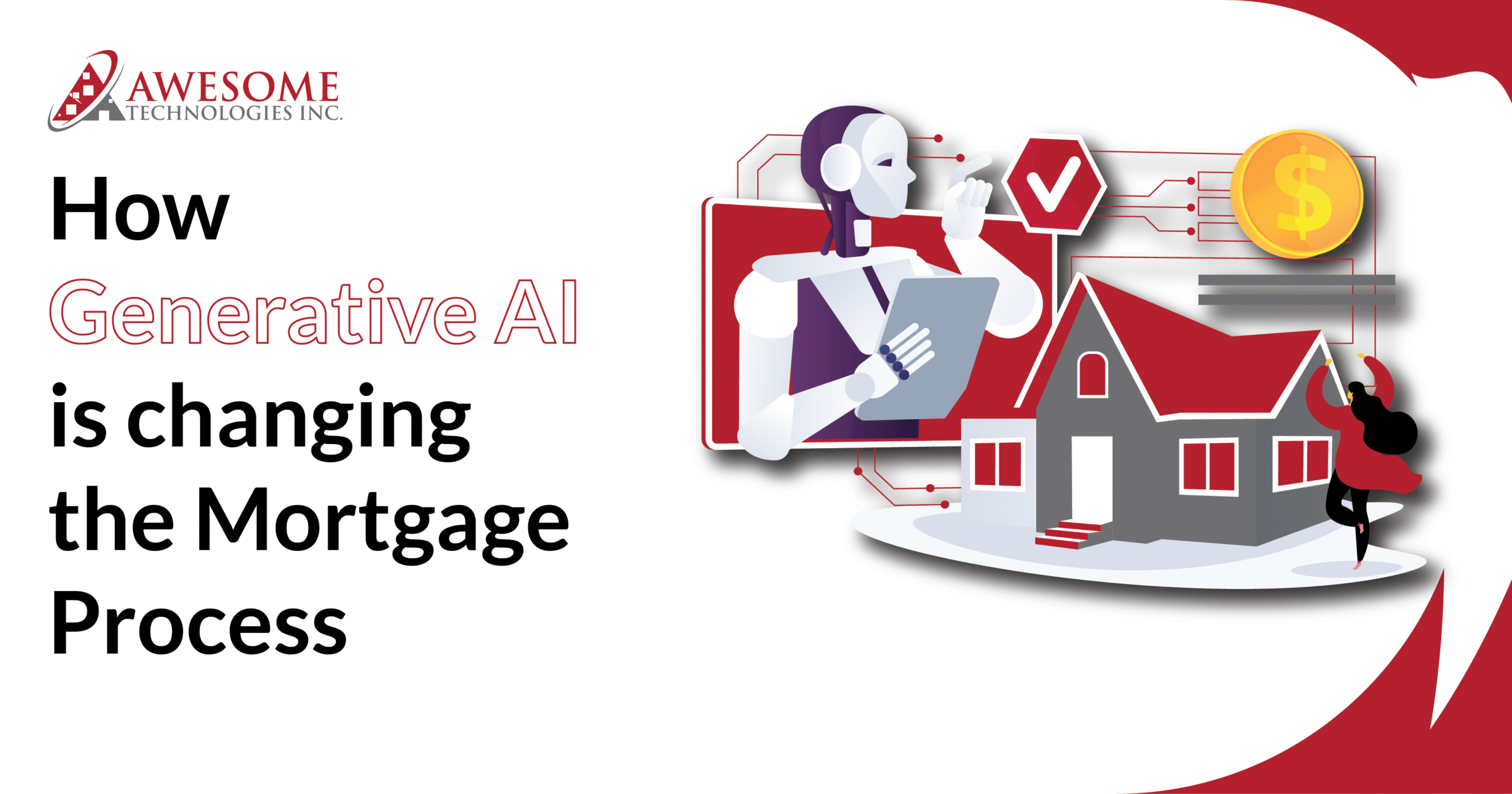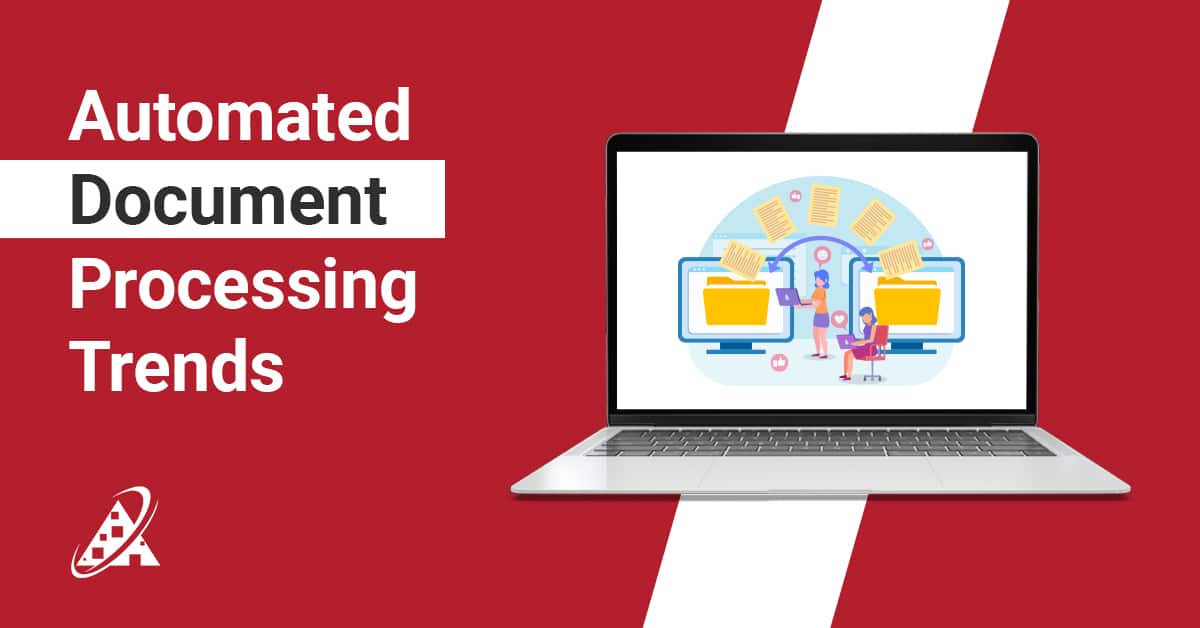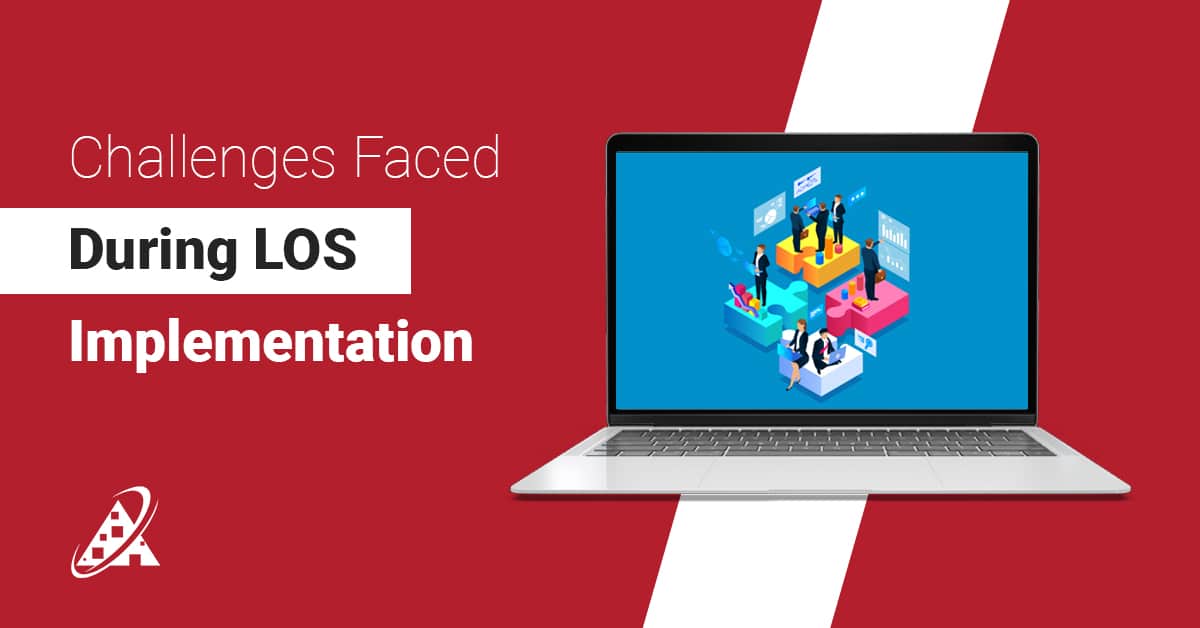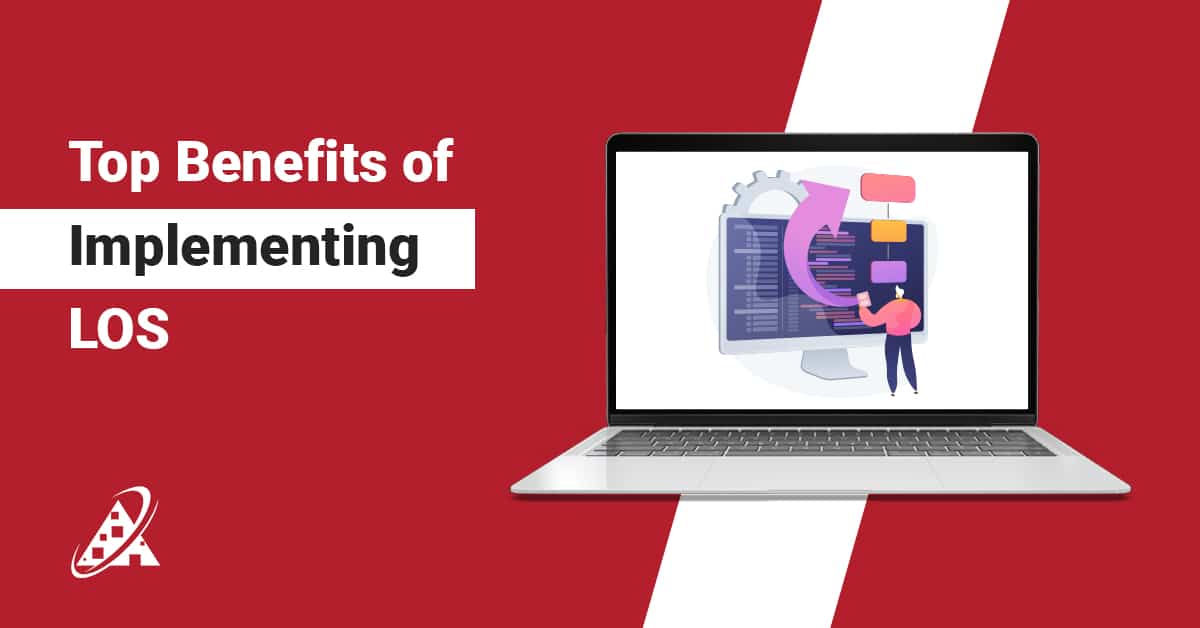Imagine being able to approve a mortgage in minutes rather than weeks or speed up automated mortgage processing. Sounds like it’s not true? It’s actually happening in the present as we see the ongoing aspects of AI mortgage lending!
The mortgage industry is undergoing transformation largely due to Generative AI. Indeed, the responsibilities and timelines traditionally defined by mortgage and other lending participants are now increasingly being altered by Generative AI or mortgage AI. The whole mortgage process has the potential to be more intelligent, efficient, accurate, and easier on the consumer, thanks to Generative Artificial Intelligence (AI) in lending. From the instant verification of documents to meaningful recommendations for loans based on personalized attributes, generative AI does wonders!
But, the incorporation of Generative Artificial Intelligence (AI) is also catalyzing a revolution in the mortgage industry. Yes we are talking about a revolution of AI in mortgage industry that has the potential to redefine how lenders service clients, assess risk, and facilitate processes. And as Generative AI continues its rapid penetration, further transformation in mortgage lending is expected . On the whole, we can see applications, benefits, disadvantages and ethical implications of AI in mortgage lending operations.
This blog seeks to review how Generative Artificial Intelligence is revolutionizing the mortgage process by “removing bureaucracy,” reducing human error, and delivering loan decisions faster and fairer. Informed awareness, if you’re a borrower with desire for a better experience or a lender with initiative to remove inefficiencies, is something you have to care about as you trust generative AI development!
Before We Dive In: What Exactly Is AI in Mortgage Lending?
Prior to exploring the many ways AI is transforming the mortgage lending process, it is important to understand what Artificial Intelligence (AI) means in the context of mortgage lending. Also, one should understand how it is already working behind the scenes to transform lending making things easier for AI mortgage brokers!
Smarter Decisions with Machine Learning & Predictive Analytics
The type of artificial intelligence associated with mortgage lending is based on Machine Learning (ML). It is a type of mortgage AI which learns from the data and improves over time. These AI systems use historical lending and banking data to accurately predict a person’s likelihood of paying back a loan. Unlike traditional credit models that rely primarily on credit scores, AI offers a more holistic view of risk. AI mortgage looks at alternate data sources, including:
- Payment history for rent and mortgage
- Payment history for bills, like utility bills
- Savings behavior and bank account activity
- Job stability and earning patterns
Analyzing these larger data sets enables lenders to evaluate applicants more fairly and approves more applicants who would be denied by strict, score-only lending practices!
Better Customer Service with NLP & AI Chatbots
Natural language processing (NLP) is another powerful capability of AI mortgage that allows computers to understand and respond to human language. Mortgage companies are using digital assistants and AI chatbots as a means of enhancing support and customer service in increasing numbers.
When a borrower asks an artificial intelligence chatbot, “What’s the lowest rate I can qualify for today?” The chatbot can quickly check market conditions, assess the customer’s financial profile and provide tailored knowledge about mortgage rates or loan options. This type of instantaneous and data-driven response of generative AI in mortgage creates buyer confidence and reduces tedious back and forth dialogue.
Efficiency Through Robotic Process Automation (RPA)
Artificial intelligence is also improving processes through robotic process automation (RPA). RPA reduces the amount of ‘human touch’ required to do repetitive tasks or automate repetitive tasks altogether. In the mortgage industry, this is eliminating non-value-added activities of AI in lending that get in the way of conducting business.
With RPA, mortgage lenders and AI mortgage brokers can:
- Fast track validation of income statements, IDs, and other documentation.
- Automatically populate the loan application with consumer information.
- Accelerate determination, compliance inspections and repeat analysis.
- Less errors, time savings, and largely reducing manual efforts, it allows staff to focus on a higher value client engagement.
Delivering a smarter, faster, and more inclusive mortgage solution, these technologies pf generative AI in mortgage provide the foundation of artificial intelligence and automation in lending. Now let’s look at how these tools work throughout the mortgage process, from submission to approval!
The AI Revolution in Mortgage Lending
With generative artificial intelligence revolutionizing mortgage lending by automating complex processes, improving decision making, and thus increasing positive customer experience. Traditional mortgage processes offer little to no personalization, lengthy approval timelines, and are primarily manual data-entry based.
With the ability to analyze large volumes of data in a thorough and rapid manner, artificial intelligence enables lenders to offer personalized solutions to borrowers, and therefore can be a solution to these problems. For example, generative AI in mortgage industry can integrate a borrower’s financial history, job status, and spending habits to create personalized loan offers. In this way, artificial intelligence systems will improve the likelihood of getting approval and providing borrower satisfaction.
The Difference Between Generative AI and Automation
Despite automation and generative artificial intelligence (AI) both wanting to promote efficiency, they have very different uses and capabilities. Automation of AI mortgage uses rules and scripts to perform repetitive tasks, without any human intervention. When compared to generative AI, machine learning is able to identify patterns, generate new content, and make decisions based on data inputs.
For instance, generative AI in mortgage process can review the creditworthiness of an applicant, predict their likelihood of defaulting on a loan, and create a loan offer based on the characteristics of that individual expert. On the other hand, automation in mortgage lending could take on more of the tasks and activities as shown, with the possibility of managing data entry or document sorting, thereby presenting a more exploratory and intelligent alternative to lending.
Key Trends in Generative AI
As Generative AI becomes more utilized in mortgage financing, some key trends will emerge:
- Utilization of AI models, historical trends, property characteristics, and market data to create accurate property valuations, reducing the time and cost associated with traditional appraisals.
- The ability of generative AI in mortgages to analyze the financial profile of a borrower enables the creation of customized loan solutions with various interest rates and repayment options. Thus, it increases approval success rates for lenders and satisfaction rates for consumers.
- Predictive underwriting leverages AI models to project likelihood of default, utilizing an assessment of risk based on historical data and patterns of behavior.
- AI powered chatbots provide customer support 24/7, answer consumer questions, guide applicants through the application process, and provide an update on loan status in real-time.
- AI automation of the preparation, review, and management of mortgage documents provides the assurance of correctness and compliance while relieving the administrative burden.
- Thanks to a reliable generative AI development company, it has Artificial intelligence (AI) systems that can identify patterns and anomalies indicative of fraudulent behavior, enhancing security and reducing financial losses.
- Artificial intelligence evaluates market data and predicts trends to help lenders make sound decisions and allows consumers to make informed choices about the best times to buy or refine.
Boosting Customer Satisfaction with Generative AI Innovations
Generative AI service is personalized, valuable, and transparent, which also boosts satisfaction of customers by supporting borrowers through the mortgage process, and alleviating worries quickly. AI generated chatbots and virtual assistants provide fast answers to the questions that borrowers have regarding their mortgage. This is practically seen in AI in mortgage banking.
Personal loan offers are based on individual financial situations that ultimately have a higher rate of approval, and customer confidence. Also, when AI can predict market trends and create quick suggestions to informative lending decisions then AI inspires confidence and loyalty.
Optimizing Operations and Cutting Costs with Generative AI Efficiency
Generative AI makes the automated mortgage process easier by automating repeatable actions, minimizing manual entry mistakes, and reducing processing times. For example, an AI could automate certain aspects of document validation, credit checks, and compliance checks, freeing-up human employees to do more challenging w or financial tasks.
This efficiency of AI in mortgage lending automation increases scalability and reduces operational costs by enabling lenders to facilitate many more applications while preserving quality. Additionally, AI’s predictive capacity is to proactively manage risk by discovering potential problems before they escalate, and maintaining continuous efficiency.
How Generative AI is Making Loan Processing More Efficient and Accurate?
Generative AI in mortgage lending increases the speed of loan processing by analyzing creditworthiness, predicting loan defaults, and generating customized loan offers from large pools of data. Machine learning algorithms may find relationships and trends in the disposition of borrower data that traditional methods might miss, resulting in better quality risk assessments.
Additionally, ai mortgage lending is able to merge documents and compliance checks, thereby reducing human error and time spent on manual work. This technology application is beneficial in loan processing as it not only speeds the availability of money, but also improves the quality and accuracy of lending decisions.
Risk Assessment and Fraud Detection Leveraging Generative AI
AI in mortgage lending automation improves risk assessment and fraud detection through the analysis of data patterns and irregularities from large sets of data. AI applications can identify unusual spending patterns, mistakes in application documents, or other indicators of potential fraud.
AI applications continue to become more accurate with experience, while continually learning from additional data, allowing lenders to more accurately identify risky borrowing behaviors and fraudsters. Having a proactive strategy of AI mortgage to deal with risk helps to secure the entire lending process and reduces financial loss.
Navigating the Future of Mortgage BFSI with Generative AI: Opportunities and Challenges
The integration of Generative AI in mortgage lending opens up opportunities for innovation, efficiencies, and enhanced customer experiences as mortgage lending continues to evolve. However, with this evolution also comes challenges such as the need for solid data governance, regulatory risk, and addressing ethical considerations such as algorithmic bias.
The opportunity to fully leverage artificial intelligence and mitigate related risks will require lenders to invest in education, infrastructure, and partnerships. Whether the AI-enabled mortgage ecosystem is responsible and effective will depend on the collaboration with technology partners, regulators, and industry participants.
The Concerns with AI in Mortgage Lending
- Algorithmic Bias:
Mortgage AI has been trained on historical data, which means that it could perpetuate existing biases related to discriminatory lending policies. For example, research found that artificial intelligence models could steer Black homebuyers to majority Black neighbourhoods, thus, sustaining segregation patterns.
- Data Privacy:
The use of personal data in AI mortgage systems raises concerns around data privacy and security. Adhering to regulations and maintaining trust requires the protection of sensitive borrower data.
- Transparency and Accountability:
When artificial intelligence systems make decisions in a black box, it is difficult for borrowers to understand how a decision has been made. Generative ai development company’s role in maintaining the public good of fairness and trust depends in part on guaranteed transparency and accountability in artificial intelligence systems.
The Challenge of Algorithmic Bias for Generative AI in the Mortgage Industry
The algorithmic bias in artificial intelligence systems can lead to unfair lending practices that mold and ill-effect marginalized communities. To mitigate this challenge, lenders can put in place measures such as:
- Data Diversity: Trying to put together data sets that reflect diverse and good representative data in order to reduce bias.
- Audit: Frequently auditing ai for mortgage loan officers and artificial intelligence systems are much needed to identify and correct for bias.
- Human Judgment: When fair decisions are at stake, include human judgment in some decisions.
- Transparency: Clear explanations of artificial intelligence decisions for borrowers.
Incorporating measures relevant to generative ai in mortgage will help basic lending practices become fair and equitable lending decisions that mitigate the risk of algorithmic bias.
Role of Ethics, Compliance, & Human-In-The-Loop Mechanism in Generative AI Paradigm for Mortgage Industry
Compliance and ethics are critical to using Generative AI appropriately in mortgage lending. The use of a Human-in-the-Loop (HITL) approach will provide flexibility in how the decision made by AI can be reconciled to human review, which protects against unfair decisions and wrongdoing.
Compliance to laws such as the Fair Housing Act and the Equal Credit Opportunity Act is necessary to avoid discrimination. The ethical aspects of generative ai in mortgage industry, like transparency, data privacy, and bias need to be diligently considered at the time of development!
The Human Touch is Still Needed When Getting a Mortgage!
As Generative AI becomes ever more incorporated into mortgage lending, it will not change the importance of the human touch. AI mortgage remains the single largest financial commitment in one’s life, and as a borrower, you will need compassion, clarity, and trust that a machine cannot provide!
While AI can be used to provide efficiencies during core processes (reviewing your application, fraud detection, and property valuation), it does not have the emotional intelligence and contextual insight of a human being during important moments (financial counseling, unexpected life changes).
Overcoming Algorithmic Bias in AI Systems at ATI!
Awesome Technologies Inc. (ATI) acknowledges that algorithmic bias is one of the major obstacles with the implementation of AI for mortgage lending purposes. To combat algorithmic bias, ATI has developed a comprehensive strategy of ai mortgage lending aimed at fairness, accountability and transparency.
ATI systematically sources multiple diverse and representative training datasets to prevent learning from biased historical data. ATI also continually reviews and updates these datasets to accommodate shifts in demographics and marketplaces. Second, ATI ensures that its use of XAI frameworks, which allow stakeholders to understand how a decision was made, are included from the very beginning—which can help identify unintended biases as early as possible in the whole process.
ATI also organizes ethics teams from multiple disciplines (w/technology, data science, law practitioners, social scientists) to audit their models pre and post implementation. ATI employs bias detection tools throughout the development lifecycle that also allow for proactive bias correction. Finally, ATI’s systems incorporate observational mechanisms that provide underwriters the ability to review and override automated decisions proactively. This holistic approach cultivates an environment where AI mortgage helps to create equity – not destroy it.
ATI’s Responsible Specific AI Strategy for the Mortgage Industry
ATI’s Responsible generative AI strategy has five main principles: fairness, accountability, transparency, privacy, and inclusivity. Their conviction is that AI must be fair to all people involved in the automated mortgage processing and especially in those situations with high impact like mortgage lending.
Fairness:
ATI systematically tests for fairness and tests AI models to be fair based on demographic, geographic, and socioeconomic data to avoid discrimination based on race, gender, or socioeconomic status.
Accountability:
ATI AI systems can only work if there is an active governance framework in place as well. Periodic internal auditing and external examination is the process to empower the ethics of the AI systems in ensuring compliance with a level of legal adherence.
Transparency:
ATI relies on explainable AI models and causes the AI to use explanations that lenders and borrowers can understand. This is an important component of trust and giving customers a way to make informed choices.
Privacy:
ATI has a solid organizational principle for handling customer protected data. It protects customer data’s legal obligations under laws from its own global registry, believing they are held to the level of transparency and disclosure in laws protecting the customer from cyber and business with identity theft (GDPR, CCPA, etc.).
Inclusivity:
ATI acknowledges the importance of system design in AI to deliver a product to all types of user groups, including those who have not been served to date, and risk creating access to AI mortgage lending not with technology but with a bias to exclude an entire community from it.
Through this comprehensive approach, ATI aims to make responsible mortgage AI not just a compliance requirement but a competitive advantage in the mortgage industry.
Future Scope
As the mortgage industry continues to transform, Generative AI will continue to open up new avenues for innovation, accessibility, and operational effectiveness. In the near term, expectations for AI in mortgage lending include an expanded role in hyper-personalized loan offers, dynamic interest rate modeling, and real-time risk assessment to develop customized lending solutions for unique borrower behaviors and market conditions.
Further, as mortgage lending grows increasingly integrated with new technologies such as blockchain, AI-improved diligence in the transactional stages will likely lead to greater transparency and trustworthy documentation. Just imagine smart contracts (via ai in mortgage lending) that automatically transfer funds from lenders to title, letting agencies conduct timelines predominantly with automatic forms. The efficiencies with this process are therefore quickly significant!
As AI for mortgage loan officers continues to evolve, it inevitably draws more attention from regulators. This means that institutions are now facing fresh compliance hurdles, especially since gaining the trust of clients is essential when they’re considering a loan. To thrive in this changing landscape, leaders will need to embrace a hybrid approach—leveraging AI to boost efficiency and accuracy while also ensuring that the human touch is there for empathy and ethical decision-making.
Looking ahead, we can expect future AI systems to be more collaborative, working hand-in-hand with human advisors to suggest mortgage products, identify irregularities, and even foresee life events that could affect a borrower’s repayment ability. These predictive features of ai in mortgage lending automation can lead to timely interventions, enhancing loan performance and keeping customers engaged.
In short, the future of Generative AI in mortgage lending is incredibly bright—but it’s crucial to approach it with care, integrity, and a focus on people. Awesome Technologies Inc. is leading the way by showing how innovative technology, when used responsibly, can foster a more inclusive, efficient, and ethical mortgage environment! Our custom mortgage development services deliver the ultimate digital experience and drive mortgage success! Let’s connect to make this happen!
Frequently Asked Questions
Why is Generative AI particularly significant for mortgage lending?
Generative AI is a game-changer in mortgage lending because it simplifies those tedious tasks like verifying documents, analyzing credit, and assessing risk. By automating these processes, it cuts down on manual work, speeds up approval times, and boosts accuracy. Plus, it allows lenders to create more personalized experiences for customers through AI-driven chatbots and tailored recommendations.
How does Generative AI help detect and mitigate fraud in BFSI?
In the BFSI sector, Generative AI plays a vital role in spotting fraud by sifting through transaction data, pinpointing unusual patterns, and flagging suspicious activities in real-time. It can cross-check information from various sources and even generate synthetic data to test and enhance fraud detection systems, making institutions more robust against ever-evolving threats.
What role do ethics and compliance play in AI-driven mortgage lending?
Ethics and compliance are essential in AI-driven mortgage lending to ensure fairness, transparency, and adherence to legal standards. AI systems need to be crafted to prevent bias and discrimination while safeguarding customer data. Staying compliant with regulations helps build trust and ensures that lending decisions are clear and justifiable.
What does the future hold for Generative AI in the mortgage industry?
The future looks bright for Generative AI in the mortgage industry, as it will continue to revolutionize the field by enabling fully digital, quicker, and more efficient loan processing. As these models advance, AI will aid in predictive decision-making and proactive risk management. However, its progress will hinge on strong regulatory frameworks and responsible AI practices.











